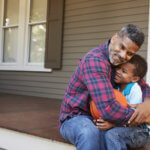Podcast: Download
Subscribe: RSS
Did you know that as many as 1 out of 4 girls and 1 out of 6 boys will experience some form of sexual abuse before the age of 18? However, because child sexual abuse is by its very nature secretive, many of these cases are never reported.
Children are most often sexually abused by someone they know and trust. Approximately three quarters of reported cases of child sexual abuse are committed by family members or other individuals who are considered part of the victim’s “circle of trust”.
The National Child Traumatic Stress Network created an excellent resource called the Child Sexual Abuse Fact Sheet. The fact sheet contains information relating to child sexual abuse, including several common myths that we tend to believe. The first step to protecting our children is understanding these myths and facts.
If you know or suspect that a child is being or has been sexually abused, please call the Childhelp® National Child Abuse Hotline at 1.800.4.A.CHILD (1.800.422.4453) or visit the federally funded Child Welfare Information Gateway at: http://www.childwelfare.gov/responding. If you need immediate assistance, call 911.
Many communities also have local Children’s Advocacy Centers (CACs) that offer coordinated support and services to victims of child abuse (including sexual abuse). For a state-by-state listing of accredited CACs, visit the website of the National Children’s Alliance.
Tips to Help Protect Children from Sexual Abuse
- Teach children accurate names of private body parts.
- Avoid focusing exclusively on “stranger danger.” Keep in mind that most children are abused by someone they know and trust.
- Teach children about body safety and the difference between “okay” and “not okay” touches.
- Let children know that they have the right to make decisions about their bodies. Empower them to say no when they do not want to be touched, even in non-sexual ways (e.g., politely refusing hugs) and to say no to touching others.
- Make sure children know that adults and older children never need help with their private body parts (e.g., bathing or going to the bathroom).
- Teach children to take care of their own private parts (i.e., bathing, wiping after bathroom use) so they don’t have to rely on adults or older children for help.
- Educate children about the difference between good secrets (like surprise parties—which are okay because they are not kept secret for long) and bad secrets (those that the child is supposed to keep secret forever, which are not okay).
- Trust your instincts! If you feel uneasy about leaving a child with someone, don’t do it. If you’re concerned about possible sexual abuse, ask questions.
The best time to talk to your child about sexual abuse is NOW!
God Bless.









0 Comments